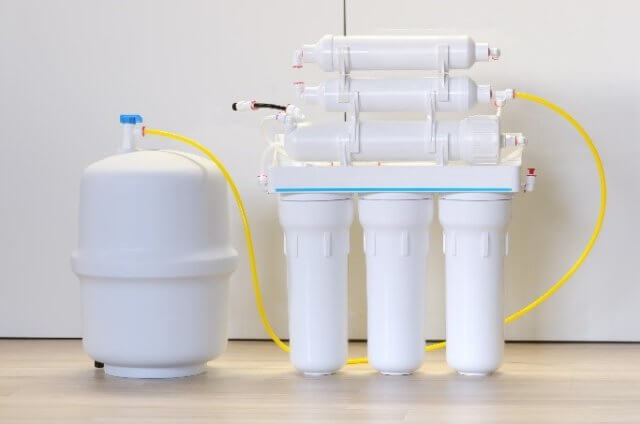When it comes to water filtration, reverse osmosis systems are one of the most popular options on the market. But what do these systems actually do? How do they work? And what are the benefits of using them? This article will answer these questions and more and discuss what a reverse osmosis system is, how it works, and the benefits it can provide. By the end of this article, you will better understand what a reverse osmosis system can do for your water!
How does a reverse osmosis water filter work?
Reverse osmosis is the process of forcing water through a semipermeable membrane. This membrane is able to filter out contaminants like lead, chlorine, and other toxins present in drinking water. The filtered water then passes through carbon or sediment filters that remove any remaining impurities, leaving you with clean, pure water.
Benefits of reverse osmosis
- Reduces harmful contaminants
Reverse osmosis is one of the most effective methods for removing dangerous contaminants from drinking water. This process eliminates up to 99% of impurities, leaving you with clean, safe water.
- Reduces sodium
High sodium levels in drinking water can harm your health, but reverse osmosis systems effectively reduce the sodium content.
- Reduces bad tastes and odours
Reverse osmosis filters can allow water to taste better and smell better by reducing unpleasant tastes and odours from your drinking water. This is a huge benefit especially if you love drinking water, and its part of your daily routine.
- Easy to install and maintain
Reverse osmosis systems are relatively easy to install and maintain, making them an excellent option for those who want an effective water filtration system without much effort. Talk to a licensed plumber about home water filtration systems and the installation thereof.
Reverse osmosis vs filtered water
Reverse osmosis is more effective than filtered water at removing impurities. Reverse osmosis systems use a semi-permeable membrane to filter out contaminants, whereas filtered water only passes the water through carbon or sediment filters. This makes reverse osmosis much more effective in eliminating bacteria and other harmful contaminants from drinking water.
Things to consider when buying a reverse osmosis system
- Water source
Before purchasing a reverse osmosis system, consider the source of water that will be filtered. If you are using tap water, make sure to research the levels of contaminants present in your area’s water supply.
- Water demand
Also, consider the amount of water that you need to filter. If you have a more prominent family or regularly host large gatherings, getting a higher capacity system will be beneficial.
- Water pressure
The water pressure of your home should also be taken into account. If you have low water pressure, then a system with a higher flow rate will be more suitable.
- System type
Think about the type of reverse osmosis system that you want. There are several options available, including countertop systems, under-sink systems, and whole-house systems.
- Budget
Make sure to consider your budget when choosing a reverse osmosis system. Prices can vary greatly depending on the type and size of the system, so make sure you have an understanding of what is available in your price range before making a purchase.
- System efficiency
When choosing a reverse osmosis system, look for one that is designed to be efficient. This means looking for systems with filters that are easy to change and systems that are designed to reduce the amount of water wasted.
- Remineralisation
It is also important to consider if the system includes remineralisation. This process adds beneficial minerals, like calcium and magnesium, back into water that a reverse osmosis system has filtered. As a result, remineralised water can help provide additional health benefits when consumed.
In conclusion, reverse osmosis effectively filters water and removes contaminants from your drinking supply. When choosing a system, consider your water source, water demand, water pressure, type of system, budget, efficiency, and remineralisation options. These factors will help you find the best reverse osmosis system for your needs. If you need any further assistance, do not hesitate to contact or talk to a licensed plumber about home water filtration.










